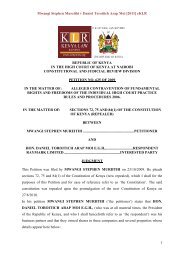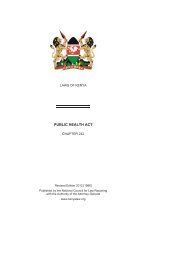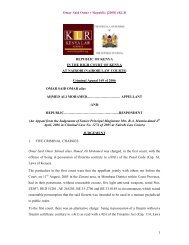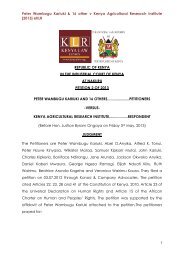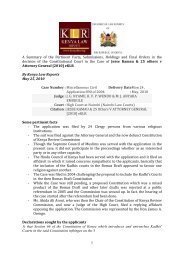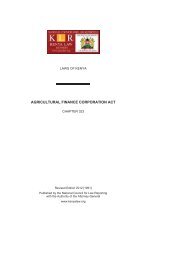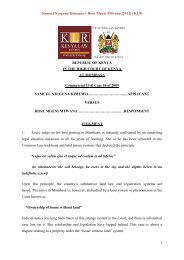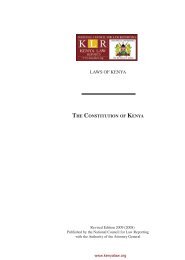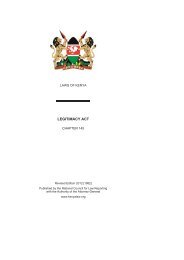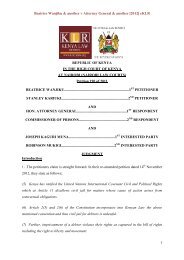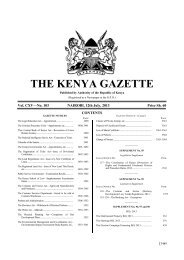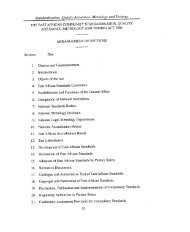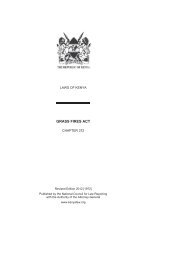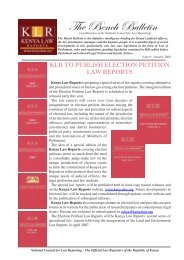the civil procedure act - Kenya Law Reports
the civil procedure act - Kenya Law Reports
the civil procedure act - Kenya Law Reports
You also want an ePaper? Increase the reach of your titles
YUMPU automatically turns print PDFs into web optimized ePapers that Google loves.
Rev. 2010] Civil Procedure CAP. 21 67of <strong>the</strong> Government concerned.17. If a person not a party to <strong>the</strong> suit who is served as mentioned in rulein <strong>the</strong> suit as against <strong>the</strong> defendant on whose behalf <strong>the</strong> notice has been given,or his own liability to <strong>the</strong> defendant, <strong>the</strong> third party must enter an appearancedoing he shall be deemed to admit <strong>the</strong> validity of <strong>the</strong> decree obtained againstsuch defendant, whe<strong>the</strong>r obtained by consent or o<strong>the</strong>rwise, and his own liabilityto contribute or indemnify, as <strong>the</strong> case may be, to <strong>the</strong> extent claimed in <strong>the</strong>third-party notice:Provided that a person so served and failing to enter an appearancean appearance, and for good cause such leave may be given upon such terms,18. In <strong>the</strong> case of third-party proceedings against <strong>the</strong> Government, rule17 shall not apply unless <strong>the</strong> court so orders; and any application for such anorder shall be made by chamber summons served not less than seven daysbefore <strong>the</strong> return day.[Subsidiary][Order 1, rule 17.]Default ofappearance by thirdparty.[Order 1, rule 18.]Default ofappearance byGovernment as thirdparty.19. Where a third party makes default in entering an appearance in<strong>the</strong> suit, or in delivering any pleading, and <strong>the</strong> defendant giving <strong>the</strong> noticesuffers judgment by default, such defendant shall be entitled, after causing<strong>the</strong> satisf<strong>act</strong>ion of <strong>the</strong> decree against himself to be entered upon <strong>the</strong> record, tojudgment against <strong>the</strong> third party to <strong>the</strong> extent claimed in <strong>the</strong> third-party notice;<strong>the</strong> court may upon <strong>the</strong> application of <strong>the</strong> defendant pass such judgment againstProvided that it shall be lawful for <strong>the</strong> court to set aside or vary anyjudgment passed under this rule upon such terms as may seem just.20. (1) A defendant shall not in any event be entitled to enter judgmentagainst <strong>the</strong> Government under rule 19 without <strong>the</strong> leave of <strong>the</strong> court.(2) Any application for leave to enter judgment against <strong>the</strong> Governmentunder this rule shall be made by chamber summons served not less than sevendays before <strong>the</strong> return day.21. (1) Where a third party makes default in entering an appearance in<strong>the</strong> suit, and <strong>the</strong> suit is tried and results in favour of <strong>the</strong> plaintiff, <strong>the</strong> court mayei<strong>the</strong>r at or after <strong>the</strong> trial enter such judgment as <strong>the</strong> nature of <strong>the</strong> suit mayrequire for <strong>the</strong> defendant giving notice against <strong>the</strong> third party:[Order 1, rule 19.]Judgment againstthird party in default.[Order 1, rule 20.]No judgment againstGovernment withoutleave of <strong>the</strong> Court.[Order 1, rule 21]Judgment after trialagainst third party indefault.Provided that execution <strong>the</strong>reof shall not be issued without leave of<strong>the</strong> court, until after satisf<strong>act</strong>ion by such defendant of <strong>the</strong> decree against him.



